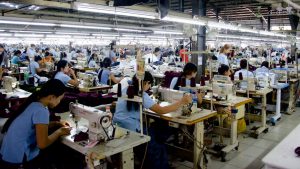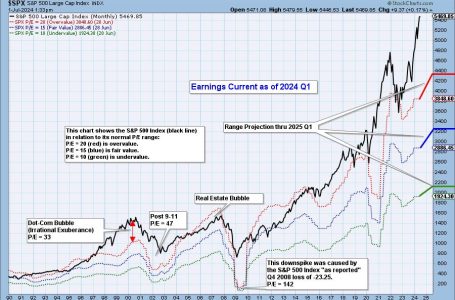S&P 500 Earnings Results Are In for 2024 Q1 and Market Is Still Overvalued
Exporters say wage hike in July would be badly timed

By Chloe Mari A. Hufana
EXPORTERS said July is “not a good time” to raise wages, citing the industry’s fragile state due to shipping and supply chain disruptions as well as the unfavorable geopolitical conditions for trade.
“As we’ve been mentioning, this is not a good time. If they can check the statistics, exports are just recovering. Globally, there are issues. The shipping issue — there are wars that are affecting the supply chains,” according to Ma. Flordeliza C. Leong, Philippine Exporters Confederation, Inc. vice-president for Advocacy, Communications and Special Concerns, speaking to BusinessWorld on the sidelines of a conference.
She called for “relief to employers” such as “a moratorium on a (wage) increase.”
The Confederation of Wearable Exporters of the Philippines has proposed a one-year moratorium on wage increases, saying they have not yet recovered from the pandemic.
They said a wage hike this year would further drive up production costs, which may cause employers to shed jobs.
Ms. Leong said her organization has no timeline to increase wages, but added that an increase this month would be difficult.
Economist and National Scientist Raul V. Fabella said it is best to keep wage hikes restrained because such measures will reduce the Philippines’ competitiveness.
“Our own wage rate adjustments depend on our inflation rate. If the latter is high, (it is) hard to keep wage rise (within) limits. Which is why the Bangko Sentral ng Pilipinas (BSP) wants to keep the benchmark interest rate high for longer to keep inflation at bay,” he told BusinessWorld via Viber.
“Rice inflation will also result in high wage response. Best to control rice inflation by reduced tariffs on rice,” he added.
The government last month lowered the tariff on imported rice to 15% from 35% to make the staple gain more affordable.
The BSP kept interest rates steady for a sixth straight meeting last week, with the Monetary Board leaving its target reverse repurchase rate at 6.5%.
Ms. Leong nevertheless considers a decision on wages by the Regional Tripartite Wages and Productivity Boards (RTWPB) preferable to a legislated wage hike.
While employers are aware of the effects of inflation on workers, Ms. Leong said a balance needs to be struck.
The Senate in February approved on third and final reading a bill increasing the daily minimum wage in the private sector by P100.
At the House of Representatives, separate bills that seek to increase wages of private-sector workers by P150 to P750 have been filed.
Last week, Labor Secretary Bienvenido E. Laguesma said a wage increase in the National Capital Region (NCR) is likely this month, but declined to say how much pay would rise.
The Employers Confederation of the Philippines signaled its readiness for a P15 to P16 increase, well below the current wage petitions.
The RTWPB-NCR is currently deciding on wage petitions after public hearings wrapped up on June 20.
It is set to release a decision on July 16, the anniversary of the last wage order in the region.
The RTWPB-NCR last year approved a P40 increase, which brought the daily minimum wage to P610 for non-agricultural workers and P573 for agricultural workers.









